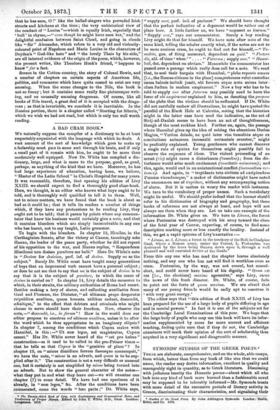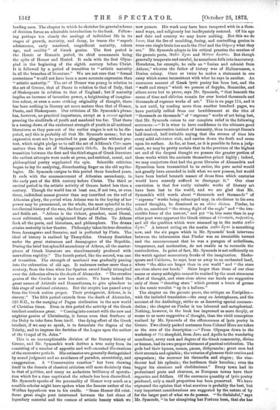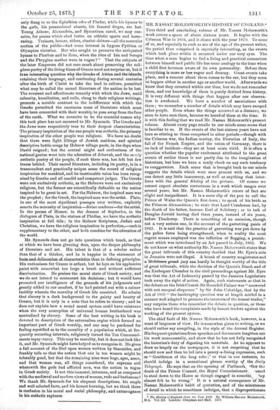SYMONDS' STUDIES OF THE GREEK POE TS.* THESE are elaborate,
comprehensive, and on the whole, able essays, from which, better than from any book of like size that we could name, the reader may derive information, excellent in quality and manageably right in quantity, as to Greek literature. Dismissing with judicious brevity the Homeric poems—about which all who look into any kind of book more learned than a fashionable novel may be supposed to be tolerably informed—Mr. Symonds treats with more detail of the successive periods of literary activity in Greece, discriminating their characteristics, and signalising their • Studies of the Greek Poets. By John Addington Symonds. London: Smith, Bider, and Co. 1873.
leading men. The chapter in which he sketches his general scheme of division forms an admirable introduction to the book. Follow, ing perhaps too closely the analogy of individual life in its stages of growth, maturity, and decay, he traces the " superb adolescence, early manhood, magnificent maturity, robust age, and senility " of Greek genius. The first period is the Heroic or Homeric period, its chief monuments being the epics of Homer and Hesiod. It ends with the first Olym- piad in the beginning of the eighth century before Christ. It is followed by a period of transition to " artistic maturity in all the branches of literature." We are not sure that "formal correctness " would not have been a more accurate expression than " artistic maturity." The art of Homer was young in relation to the art of Greece, that of Dante in relation to that of Italy, that of Shakespeare in relation to that of England ; but if maturity implies an increase of inventive power, a heightening of imagina- tive colour, or even a more Striking originality of thought, there has been nothing in literary art more mature than that of Homer, Dante, and Shakespeare. Our criticism of Mr. Symonds's phrase has, however, no practical importance, except as a caveat against pressing the similitude of youth and manhood too far. That there is a toning-down of the exuberant strength of youth in all national literatures as they pass out of the earlier stages is not to be dis- puted, and this is probably all that Mr. Symonds means ; but an expression must not be permitted to pass altogether without pro- test, which might pledge us to call the art of Addison's Cato more mature than the art of Shakespeare's Othello. In the period of transition between the first and the third stages of Greek literature the earliest attempts were made at prose, and satirical, moral, and philosophical poetry supplanted the epic. Scientific criticism began to lay its analysing, disenchanting finger on the old mytho- logies. Mr. Symonds assigns to this period three hundred years. It ends with the commencement of Athenian ascendency, in the early part of the fifth century before Christ. The third or central period in the artistic activity of Greece lasted less than a century. Though the world has at least one, if not two, or even three, individual names greater than any inscribed on the roll of Athenian glory, the period when Athens was in the heyday of her power may be pronounced, on the whole, the most splendid in the intellectual history of the race, the focal period of literary, pictorial, and fictile art. " Athens is the richest, grandest, most liberal, most cultivated, most enlightened State of Hellas. To Athens flock all the poets, and historians, and philosophers. The drama attains maturity in her theatre. Philosophy takes its true direction from Anaxagoras and Socrates, and is perfected by Plato. The ideal of history is realised by Thucydides. Oratory flourishes under the great statesmen and demagogues of the Republic. During the brief but splendid ascendency of Athens, all the master- pieces of Greek literature are simultaneously produced with marvellous rapidity." The fourth period, like the second, was one of transition. The strength of manhood was gradually passing into the exhaustion of old. age. It embraces rather more than a century, from the time when the Spartan sword finally triumphed over the Athenian olive to the death of Alexander. " The creative genius of the Greeks is now less active. We have indeed the great names of Aristotle and Demosthenes, to give splendour to this stage of national existence. But the sceptre has passed away from the Greek nation proper. Their protagonist, Athena, is in slavery." The fifth period extends from the death of Alexander, 323 B.C., to the merging of Pagan civilisation in the new world of Christian times. Even in this period the activity of the Greek intellect continues great. " Coming into contact with the new and mightier genius of Christianity, it forces even that firstborn of . the Deity to take form from itself. One dying effort of the Greek intellect, if we may so speak, is to formulate the dogma of the Trinity, and to impress the doctrine of the Logos upon the author of the Gospel of St. John."
This is an unexceptionable division of the literary history of Greece, and Mr. Symonds's work derives a true unity from its consisting of a number of apposite and well-executed illustrations of the successive periods. His estimates are generally distinguished by sound judgment and an avoidance of paradox, eccentricity, and exaggeration. A "Conservative reaction" has been showing itself in the domain of classical criticism still more decisively than in that of politics, and many an audacious brilliancy of specula- tion which for a time captivated the schools has been discredited. Mr. Symonds speaks of the personality of Homer very much as a sensible scholar might have spoken when the famous author of the Wolfian hypothesis was in his cradle. "Some Homer did exist. Some great single poet intervened between the lost chaos of legendary material and the cosmos of artistic beauty which We now possess. His work may have been tampered with in a thou- sand ways, and religiously but inad'equately restored. Of his age and date and country we may know nothing. But this we do know, that the fire of moulding, fusing, and controlling genius in some one single brain has made the Iliad and the Odyssey what they are." Mr. Symonds adopts in his critical practice the maxims of
the gnomic poets, Y 7a.v and Mgrpov lipterrou. But though generally temperate and careful, he sometimes falls into inaccuracy. Herodotus, for example, he calla an "Ionian and colonist from Athens," whereas the father of history was of Halicarnassus, a Dorian colony. Once or twice he makes a statement in one essay which seems inconsistent with what he says in another. An enormous amount of Greek lyric poetry has been lost, and the "waifs and strays" which we possess of Sappho, Simonides, and others serve but to prove, says Mr. Symonds, " that beneath the ocean of time and oblivion remain for ever buried thousands and thousands of supreme works of art." This is on page 114, and it is not until, by reading more than another hundred pages, we have partially rallied from our bewilderment at the idea of "thousands on thousands" of " supreme " works of art being lost, that Mr. Symonds coins to our complete relief in the following sentences :—" It is wiser to have confidence in the ultimate good taste and conservative instinct of humanity, than to accept Bacon's half-ironical, half-irritable saying that the stream of time lets every solid substance sink, and carries down the froth and scum upon its surface. As far, at least, as it is possible to form a judg- ment, we may be pretty certain that in the province of the highest art and of the deepest thought we possess the greater portion of those works which the ancients themselves prized highly ; indeed, we may conjecture that had the great libraries of Alexandria and Byzantium been transmitted to us entire, the, pure metal would not greatly have exceeded in bulk what we now possess, but would have been buried beneath masses of dross from which centuries would have scarcely sufficed to disengage it." Our clear conviction is that few really valuable works of literary art have been lost to the world, and we are glad that Mr. Symonds's wild words about " thousands and thousands " of " supreme" works being submerged may, in obedience to his owu second thoughts, be dismissed as an obiter dictum. Pindar, he tells us, combined "the strong flight of the eagle" and "the irre- sistible force of the torrent," and yet "in him more than in any other poet were apparent the Greek virtues of 62mA/cc, creep/J.5(16n, and all the qualities which were summed up in the motto p.71bils ciyay." A torrent acting on the maxim ,umdiv Ay= is something new, and the six pages which in Mr. Symonds' book intervene between the information that Pindar was an irresistible torrent and the announcement that he was a paragon of orderliness, temperance, and moderation, do not enable us to reconcile the contradiction. In point of fact, Mr. Symonds is not sufficiently on the watch against momentary freaks of the imagination. Shake- speare and Calderon, he says, bear us away to an enchanted land, where " the skies are larger than in our world " and " the stars are close above our heads." Skies larger than those of our clear noons or starry midnights cannot be realised by the most strenuous effort of thought, and stars close above our heads are suggestive only of those " shooting stars " which present a brace of grouse to the comic vocalist " up in a balloon."
The chapter on the gnomic poets, the critique on Euripides— with the included translation—the essay on Aristophanes, and the account of the Anthology, strike us as deserving special commen- dation; the chapter on Pindar is too laboured and metaphorical. Nothing, however, in the book has impressed us more deeply, or seems to us more suggestive of thought, than the vivid conception realised by Mr. Symonds of the efflorescence of lyric poetry in Greece. Two closely packed sentences from Colonel Mure are taken as the core of the description :—" From Olympus down to the workshop or the sheepfold, from Jove and Apollo to the wandering mendicant, every rank and degree of the Greek community, divine or human, had its own proper allotment of poetical celebration. The gods had their hymns, nomes, reans, dithyrambs ; great men had their encomia and epinikia ; the votaries of pleasure their erotica and symposiaca; the mourner his threnodia and elegies ; the vine- dresser had his epilenia ; the herdsmen their bacolica ; even the
beggar his eiresione and chelidonisma." Every town had its professional poets and choruses, as European towns have their organists and fiddlers. Of the enormous quantity of lyric poetry produced, only a small proportion has been preserved. We have expressed the opinion that what survives is probably the beat, but
very important considerations are suggested by the nature of by far the larger part of what we do possess. " So disdainful," says Mr. Symonds, " in her almsgiving has Fortune been, that she has
only flung to us the Epinikian odes of Pindar, while his hymns to the gods, his processional chants, his funeral dirges, are lost. Young Athens, Alexandria, and Byzantium cared, we may con- ceive, for poems which shed lustre on athletic sports and horse- racing. Trainers, boxers, riders, chariot-drivers—all the muscular section of the public—bad some interest in bygone Pythian or Olympian victories. But who sought to preserve the antiquated hymns to Phoebus and to Zeus, when the rites of Isis and Serapis and the Phrygian mother were in vogue ?" That the subjects of the later Emperors did not care much about preserving the reli- gious poetry of the living times of Greece need not surprise us, but it is-an ietorestieg question why the Greeks of Aftiea and the isianchr, retaining their language, and continuing during several centuries after the birth of Christ to take the lead in culture, permitted what may be called the sacred literature of the nation to be lost. The reverent and affectionate tenacity with which the Jews, amid calamity, humiliation, and exile, clung to their religious writings, presents a notable contrast to the indifference with which the Greeks permitted the enormous mass of literature which must have been connected with their worship to pass away from the face of the earth. What we conceive to be the essential reason why this took place has not occurred to Mr. Symonds. The Greeks and the Jews were respectively true to their deepest characteristics. The primary inspiration of the one people was esthetic, the primary inspiration of the other people was religious. We have no doubt that there were light liltings of Jewish maidens, and spirited descriptive battle-songs by Hebrew village poets, in the days when David reigned ; but the central might and enthusiasm of the national genius went into the adoration of Jehovah, and the merely esthetic poetry of the people, if such there was, has left but few traces behind. Their sacred literature, including its poetry, is in a transcendent and practically unique sense the record of religious inspiration for mankind, and its inestimable value has been recog- nised by Goethe and all candid and competent judges. The Greeks were not exclusively esthetic, as the Hebrews were not exclusively religious, but the former are scientifically definable as the nation inspired to be great in art. For the Hebrew, the inspired man was the prophet ; for the Greek, the inspired man was the artist. Plato, in one of the most significant passages ever written, explicitly asserts the necessity of inspiration—divine madness—for the artist. In the poems of Homer, in the dramas of Sophocles, in the dialogues of Plato, in the statues of Phidias, we have the esthetic inspiration at full tide ; in the Hebrew Scriptures, Judaic and Christian, we have the religious inspiration in perfection,—each is supplementary to the other, and both combine for the education of the world.
Mr. Symonds does not go into questions which touch, as that at which we have been glancing does, upon the deeper philosophy of literature and art. His talent is that of a scholar rather than that of a thinker, and he is happier in the statement of fame and rIplinp_atinn of_ehararkpriatira than in defining principles His enthusiasm for Greece is ardent, but he lays on his applausive paint with somewhat too large a brush and without sufficient discrimination. He praises the moral state of Greek society, and we do not intend to controvert his decisions ; but it would have promoted our intelligence of the grounds of his judgments and greatly added to our comfort, if he bad pointed out with a calmer lucidity wherein the morality of Greek life consisted. He admits that slavery is a dark background to the gaiety and beauty of Greece, but it is only in a note that he refers to slavery ; and he does not explain how a sound moral system could have existence when the very conception of universal human brotherhood was neutralised by slavery. Some of the best writing in his book is devoted to description of the saturnalian orgies which formed an important part of Greek worship, and one may be pardoned for feeling mystified as to the morality of a populittion which, at fre- quently recurring intervals, religiously turned the Ten Command- ments topsy-turvy. This may be morality, but it does not look like it, and Mr. Symonds might have helped us to recognise it. He gives a full account of the libel upon women written by Simonides, and frankly tells us that the notion that one in ten women might be tolerably good, but that the remaining nine were hogs, apes, asses, and that woman was, all things considered, the supreme evil wherewith the gods bad afflicted men, was the notion in vogue in Greek society. Ia not this immoral, inhuman, and as compared with the medieval and modern views of woman, rude and barbarous? We thank Mr. Symonds for his eloquent descriptions, his ample and well selected facts, and his honest learning, but we think there is confusion in his moral and social philosophy, and extravagance in his esthetic raptures.








































 Previous page
Previous page